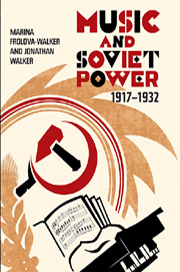24 results
13 - Playing Scriabin: Reality and Enchantment
-
-
- Book:
- Demystifying Scriabin
- Published by:
- Boydell & Brewer
- Published online:
- 07 October 2022
- Print publication:
- 14 January 2022, pp 247-268
-
- Chapter
- Export citation
Nikolai Rimsky-Korsakov - The Golden Cockerel Vladimir Feliauer bass-bar, Aida Garifullina sop Mariinsky Orchestra and Chorus, Valery Gergiev cond Anna Matison stage dir Mariinsky 596, 2017 (2 DVDs: 119 minutes) - Золотой петушок/Le coq d'or/The Golden Cockerel Pavlo Hunka bass-bar, Alexey Dolgov ten, Konstantin Shushakov bar, Alexander Vassiliev bass, Agnes Zwierko mezzo La Monnaie Symphony Orchestra and Chorus, Alain Altinoglu cond Laurent Pelly stage dir BelAir Classiques 147, 2018 (1 DVD: 118 minutes)
-
- Journal:
- Nineteenth-Century Music Review / Volume 17 / Issue 2 / August 2020
- Published online by Cambridge University Press:
- 24 March 2020, pp. 321-324
-
- Article
- Export citation
An Inclusive History for a Divided World?
-
- Journal:
- Journal of the Royal Musical Association / Volume 143 / Issue 1 / 2018
- Published online by Cambridge University Press:
- 01 January 2020, pp. 1-20
- Print publication:
- 2018
-
- Article
- Export citation
Contributors
-
-
- Book:
- Representation in Western Music
- Published online:
- 05 April 2013
- Print publication:
- 11 April 2013, pp xi-xiv
-
- Chapter
- Export citation
3 - ‘Music is obscure’: textless Soviet works and their phantom programmes
- from Part I - Representation and the interpretation of musical meaning
-
-
- Book:
- Representation in Western Music
- Published online:
- 05 April 2013
- Print publication:
- 11 April 2013, pp 47-63
-
- Chapter
- Export citation
Contents
-
- Book:
- Music and Soviet Power, 1917–1932
- Published by:
- Boydell & Brewer
- Published online:
- 05 April 2013
- Print publication:
- 19 July 2012, pp vi-viii
-
- Chapter
- Export citation
Note on transliteration
-
- Book:
- Music and Soviet Power, 1917–1932
- Published by:
- Boydell & Brewer
- Published online:
- 05 April 2013
- Print publication:
- 19 July 2012, pp xx-xx
-
- Chapter
- Export citation
Key to Acronyms and Institutional Bodies
-
- Book:
- Music and Soviet Power, 1917–1932
- Published by:
- Boydell & Brewer
- Published online:
- 05 April 2013
- Print publication:
- 19 July 2012, pp 341-344
-
- Chapter
- Export citation

Music and Soviet Power, 1917–1932
-
- Published by:
- Boydell & Brewer
- Published online:
- 05 April 2013
- Print publication:
- 19 July 2012
Glossary of Names
-
- Book:
- Music and Soviet Power, 1917–1932
- Published by:
- Boydell & Brewer
- Published online:
- 05 April 2013
- Print publication:
- 19 July 2012, pp 345-380
-
- Chapter
- Export citation
Preface
-
- Book:
- Music and Soviet Power, 1917–1932
- Published by:
- Boydell & Brewer
- Published online:
- 05 April 2013
- Print publication:
- 19 July 2012, pp ix-xix
-
- Chapter
- Export citation
Chronology of Political and Musical Events
-
- Book:
- Music and Soviet Power, 1917–1932
- Published by:
- Boydell & Brewer
- Published online:
- 05 April 2013
- Print publication:
- 19 July 2012, pp xxi-xxviii
-
- Chapter
- Export citation
Acknowledgements
-
- Book:
- Music and Soviet Power, 1917–1932
- Published by:
- Boydell & Brewer
- Published online:
- 05 April 2013
- Print publication:
- 19 July 2012, pp xx-xx
-
- Chapter
- Export citation
Bibliography
-
- Book:
- Music and Soviet Power, 1917–1932
- Published by:
- Boydell & Brewer
- Published online:
- 05 April 2013
- Print publication:
- 19 July 2012, pp 381-390
-
- Chapter
- Export citation
Frontmatter
-
- Book:
- Music and Soviet Power, 1917–1932
- Published by:
- Boydell & Brewer
- Published online:
- 05 April 2013
- Print publication:
- 19 July 2012, pp i-v
-
- Chapter
- Export citation
Index
-
- Book:
- Music and Soviet Power, 1917–1932
- Published by:
- Boydell & Brewer
- Published online:
- 05 April 2013
- Print publication:
- 19 July 2012, pp 391-404
-
- Chapter
- Export citation
Serge Rachmaninoff, Fugue in D minor (1891) (London: Boosey & Hawkes, 2004). £17.50; Suite in D minor (1891) (London: Boosey & Hawkes, 2004). £24.50 (Complete Works of Sergei Rachmaninoff)
-
- Journal:
- Nineteenth-Century Music Review / Volume 2 / Issue 2 / November 2005
- Published online by Cambridge University Press:
- 13 April 2011, pp. 240-242
-
- Article
- Export citation
The Cambridge Companion to Shostakovich. Ed. Pauline Fairclough and David Fanning. Cambridge, Eng.: Cambridge University Press, 2008. xv, 397 pp. Appendix. Notes. Bibliography. Chronology. Index. Tables. Maps. Musical Examples. $95.00, hard bound. $36.99, paper.
-
- Journal:
- Slavic Review / Volume 69 / Issue 2 / Summer 2010
- Published online by Cambridge University Press:
- 27 January 2017, pp. 492-494
- Print publication:
- Summer 2010
-
- Article
- Export citation
The Soviet opera project: Ivan Dzerzhinsky vs. Ivan Susanin
-
- Journal:
- Cambridge Opera Journal / Volume 18 / Issue 2 / July 2006
- Published online by Cambridge University Press:
- 18 January 2007, pp. 181-216
- Print publication:
- July 2006
-
- Article
- Export citation
11 - Russian opera: between modernism and romanticism
- from Part three - Topographies
-
-
- Book:
- The Cambridge Companion to Twentieth-Century Opera
- Published online:
- 28 September 2011
- Print publication:
- 08 December 2005, pp 181-196
-
- Chapter
- Export citation

